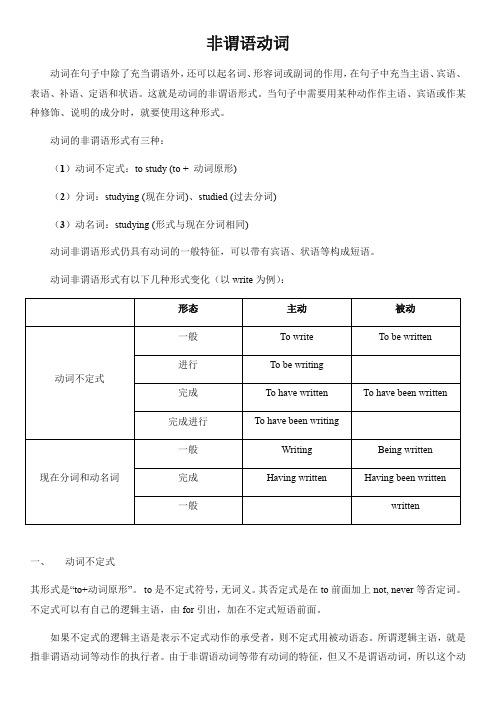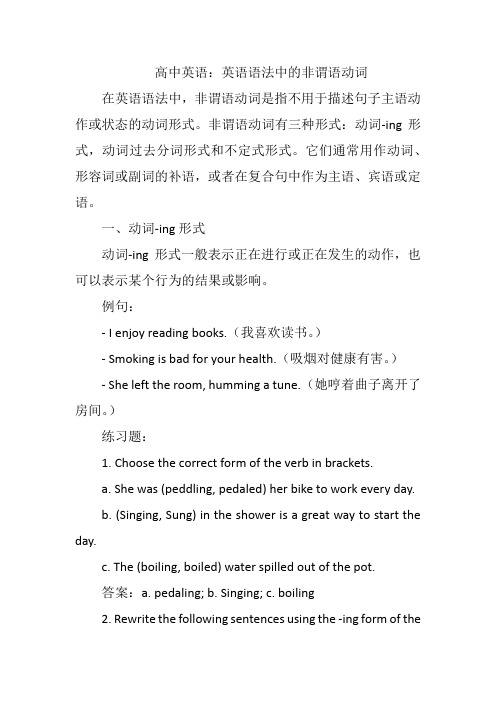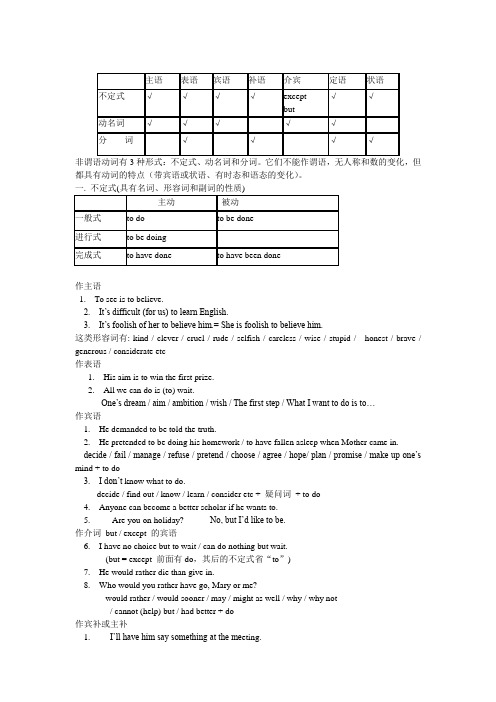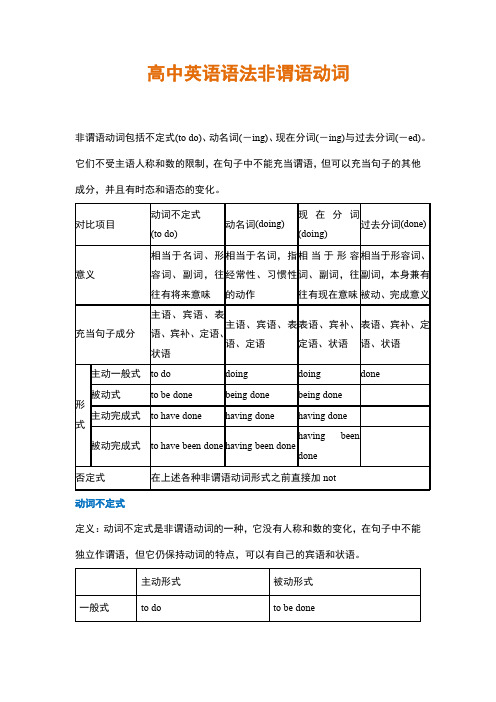高中英语_非谓语动词
高中英语语法 非谓语动词 全

非谓语动词非谓语动词。
在英语中,不能作句子谓语,而是担任其它语法功能的动词叫做非谓语动词。
非谓语动词的时态和语态的不同形式动词不定式动名词分词主动to do doing doing(同时,主动)被动to be done being done done(被动,完成)进行主动to be doing进行被动being done进行,被动主动完成to havedone having done having done(主动,完成一般作状语)被动完成to havebeen done having beendonehaving beendone(被动,完成一般作状语)非谓语动词在句中的作用主语宾语表语补语定语状语不定式√√√√√√动名词√√√√分词√√√√一:分词(现在分词和过去分词,分别表示:主动,行进&被动,完成)1)作定语The girl standing by the window is my sister.=The girl who is standing by the window is my sister.This is a book written by a famous Chinese writer.= This is a book which was written by a famous Chinese writer.2) 作状语(一般表示时间,原因,条件,伴随)有时可将从句中when/while /unless/if 等保留(While/When)Walking in the street ,I saw her.=While/When I was walking in the street ,I saw her.(表示时间)Seen from the hill,our school looks more beautiful.=When our school is seen from the hill,it looks more beautiful.从小山上看,我们学校更美了。
高中英语语法非谓语动词

非谓语动词一、动词的-ed形式1.动词-ed形式作状语(1)动词-ed形式作状语,进一步说明谓语动词的动作或状态,其逻辑主语通常就是句子的主语。
Used with care, one tin will last for six weeks.Translated into English, the sentence was found to have an entirely different word order.(2)某些动词的过去分词已经形容词化,此时这些过去分词表示一种状态。
这样的词(组)常见的有:lost (迷路的), seated (坐), hidden (躲), stationed (驻扎), lost/absorbed in (沉溺于), dressed in (穿着), tired of (感到厌倦)等。
Absorbed in his book, he didn’t notice me enter the room.2.动词-ed形式作定语动词-ed形式(短语)作定语与它所修饰的名词之间在逻辑上存在被动关系,并表示该动作的被动或完成。
Tsinghua University, founded in 1911, is home to a great number of outstanding figures.3.动词-ed形式作宾语补足语动词-ed形式作宾语补足语时,句中的宾语往往就是其逻辑主语,该动词与宾语之间存在动宾关系。
Michael put up a picture of Yao Ming beside the bed to keep himself reminded of his own dreams.4.动词-ed形式作表语动词-ed形式作表语时,大多数是已经形容词化的过去分词。
如:seated, disappointed, stuck, excited等。
In April, thousands of holidaymakers remained stuck abroad due to the volcanic ash cloud.二、动词的-ing形式1.动词-ing形式作状语(1)动词的-ing形式作状语表示在进行一动作的同时所进行的另一动作,它对谓语动词起修饰和陪衬的作用。
高中英语语法非谓语动词

非谓语动词动词在句子中除了充当谓语外,还可以起名词、形容词或副词的作用,在句子中充当主语、宾语、表语、补语、定语和状语。
这就是动词的非谓语形式。
当句子中需要用某种动作作主语、宾语或作某种修饰、说明的成分时,就要使用这种形式。
动词的非谓语形式有三种:(1)动词不定式:to study (to + 动词原形)(2)分词:studying (现在分词)、studied (过去分词)(3)动名词:studying (形式与现在分词相同)动词非谓语形式仍具有动词的一般特征,可以带有宾语、状语等构成短语。
动词非谓语形式有以下几种形式变化(以write为例):一、动词不定式其形式是“to+动词原形”。
to是不定式符号,无词义。
其否定式是在to前面加上not, never等否定词。
不定式可以有自己的逻辑主语,由for引出,加在不定式短语前面。
如果不定式的逻辑主语是表示不定式动作的承受者,则不定式用被动语态。
所谓逻辑主语,就是指非谓语动词等动作的执行者。
由于非谓语动词等带有动词的特征,但又不是谓语动词,所以这个动作的执行者就不能称为主语,而在逻辑上又是这个动作的执行者,所以就称为逻辑主语。
如果不定式逻辑上的主语是这个不定式所表示的动作的承受者,这个不定式一般要用被动语态。
疑问词(who, whom, whose, what, which, when, where, why, how还包括whether)等后面加不定式构成不定式短语,可做主语,表语,宾语等。
(一)作主语。
在不定式短语作主语的句子中,往往用it 作形式主语,而不把不定式短语放在句子的后面。
如:To die like that is a terrible thing.=It is a terrible thing to die like that.象那样死去是一件可怕的事。
(it 作形式主语,把真正的主语to die like that放在后面)To know oneself is difficult.=It’s difficult to know oneself.有自知之明不容易。
(完整版)高中英语非谓语动词详解

第二讲非谓语动词教学重点1,非谓语动词和谓语动词的区别;2,非谓语动词的各种形式和应用;3,非谓语动词的考点解析。
一、非谓语动词与非谓语动词的区别1.谓语动词在句中可单独作谓语,而非谓语动词不能单独作谓语。
如:Miss Mary teaches us English . 玛丽教我们英语。
(teaches是谓语动词。
)Mr Victor came to our classroom to have a talk with us last week.维克托先生上周末来到了我们教室和我们谈话。
(to have a talk不定式作状语)2.谓语动词受主语的人称和数的限制,而非谓语动词形式没有这种限制。
如:Tom likes the pop music. 汤姆喜欢流行音乐。
(动词用第三人称单数形式)Tom has nothing to do today. 汤姆今天没有什么事要做。
(do用原形)二、非谓语动词的各种形式和应用非谓语动词主要包括不定式、动名词和分词。
其动能和形式如下:非谓语动词在句中所做的成分如下:三、考点解析非谓语动词一直是高考中的热点。
解答非谓语动词的题目时,一定要解析句子结构,确定所设空是谓语动词还是非谓语动词,以及非谓语动词在句子中充当的功能(如状语、定语或宾补);找准相关动词的逻辑主语,确定该动词与逻辑主语是什么关系(主动还是被动);搜索句子中相关的时间信息,确定非谓语动词的恰当形式。
1 动名词和不定式作表语①如果表语是不定式,主语也是不定式;表语是动名词,主语也是动名词。
如:To see is to believe.=Seeing is believing.②动名词作主语的句型。
如:It is no use/no good/useless doing sth.It is a waste of time doing(也可用It is a waste of time to do)③动词不定式和动名词的复合结构:动词不定式的复合结构有两种:It is difficult/easy/possible/necessary/...for sb. to do sth.和It is kind/wise/foolish/considerate/...of sb. to do。
高中英语非谓语动词

一、不定式to do1.形式:肯定式:to do sth 否定式:not to do sth.被动式:to be done 完成式:to have done2.成分(1)主语不定式做主语时,可以直接放在谓语动词之前。
注:常用it做形式主语,将to do 放在位于之后,使句子保持平衡。
句型1:It + 谓语 + to do句型2:It’s + n. + to do句型3:It is adj. for/of sb. to do sth.Eg.It is easy for me to finish this work before ten.It is a great honor for us to be present at your birthday party.(2)作宾语1).接不定式做宾语eg.I don’t expect to meet you here.常见动词有:want, decide, hope, agree, choose, wish, need ,promiselike, demand, expect, begin, determine, refuse, offer, fail, manage, learn, seem, intend, forget, mean, prepare, pretend, continue, start, afford, hate等2). 常跟疑问词+不定式作宾语的动词常见的动词有:tell, advise, show, teach, find out, decide, discuss, learn, explain,know, show, discover, see(understand)Eg.He taught us how to use the tool.No one could tell me where to get the book.(3)作表语1)、主语 + be + to do sth主语多为 duty / wish / hope / idea / plan / ambition/ dream / work / job 等名词(4)作宾语补足语(与宾语之间的关系实际上是逻辑上的主谓关系)eg.Mother told me to come back before 10 o’clock.常见加to do 的动词:advise allow ask beg cause expect encourage force get hate invite order wish want warn remind promise permit persuade request… +sb. to do加不带to的不定式的动词:see watch look at hear listen to feel noticesb. be + seen watched looked at heard listened to felt noticed + to do注意:当这类动词转为被动语态时,其后的不定式则要加上“to”如:He is often heard to sing the song.(5)it作形式宾语注意:不定式短语作宾语时,如果还带有宾语补足语,往往把不定式宾语放在宾语补足语之后,而用it作形式宾语。
高中英语语法非谓语动词详解

高中英语语法非谓语动词详解高中英语语法非谓语动词详解在高级英语语法中,非谓语动词是非常重要的一部分,也是理解和掌握英语语法的关键。
非谓语动词在句子中扮演着重要的角色,可以表达不同的意思和功能。
本文将详细解释非谓语动词的定义、类型和用法,并通过实例进行分析和解释。
一、定义和类型非谓语动词指的是在句子中不作为主要动词的动词形式,它们可以表达动词本身的含义,但没有主语和谓语动词。
非谓语动词包括动词不定式、动名词和分词三种类型。
1、动词不定式:动词不定式是以“to+”动词原形构成的,表示动词的不同形式,如“to do”、“to being”、“to have done”等。
2、动名词:动名词是在动词后加上“-ing”构成的,表示动词的现在分词形式,如“playing”、“swimming”、“jumping”等。
3、分词:分词是动词的过去分词形式,分为现在分词和过去分词两种。
现在分词表示动词的动作正在进行,如“running”、“singing”、“dancing”等;过去分词表示动词的动作已经完成,如“finished”、“eaten”、“read”等。
二、非谓语动词的用法非谓语动词在句子中可以扮演不同的成分,如主语、宾语、状语等。
下面我们通过具体的例子来分析非谓语动词的用法:1、动词不定式:在句子中,动词不定式可以作为主语、宾语和状语等。
例如,“To learn English is important”(学习英语很重要)中,动词不定式“to learn English”作为主语;或者在“I want to go home”(我想回家)中,动词不定式“to go home”作为宾语。
2、动名词:在句子中,动名词可以作为主语、宾语和状语等。
例如,“Playing sports is fun”(做运动很有趣)中,动名词“Playing sports”作为主语;或者在“I enjoy listening to music”(我喜欢听音乐)中,动名词“listening to music”作为宾语。
高中英语:英语语法中的非谓语动

高中英语:英语语法中的非谓语动词在英语语法中,非谓语动词是指不用于描述句子主语动作或状态的动词形式。
非谓语动词有三种形式:动词-ing形式,动词过去分词形式和不定式形式。
它们通常用作动词、形容词或副词的补语,或者在复合句中作为主语、宾语或定语。
一、动词-ing形式动词-ing形式一般表示正在进行或正在发生的动作,也可以表示某个行为的结果或影响。
例句:- I enjoy reading books.(我喜欢读书。
)- Smoking is bad for your health.(吸烟对健康有害。
)- She left the room, humming a tune.(她哼着曲子离开了房间。
)练习题:1. Choose the correct form of the verb in brackets.a. She was (peddling, pedaled) her bike to work every day.b. (Singing, Sung) in the shower is a great way to start the day.c. The (boiling, boiled) water spilled out of the pot.答案:a. pedaling; b. Singing; c. boiling2. Rewrite the following sentences using the -ing form of theverbs in brackets.a. She ate breakfast and then she left the house. (walk)b. I heard a noise and I woke up. (look)c. He finished his work and then he went to bed. (read)答案:a. She left the house, walking.b. I woke up, looking around.c. He went to bed, reading.二、动词过去分词形式动词过去分词形式一般用来表示被动、完成或已经发生的动作,也可以作为形容词或状语的补语。
高中 英语语法 非谓语动词 详解

非谓语动词有3种形式:不定式、动名词和分词。
它们不能作谓语,无人称和数的变化,但都具有动词的特点(带宾语或状语、有时态和语态的变化)。
一. 不定式(具有名词、形容词和副词的性质)作主语1. To see is to believe.2. It’s difficult (for us) to learn English.3. It’s foolish of her to believe him.= She is foolish to believe him.这类形容词有: kind / clever / cruel / rude / selfish / careless / wise / stupid / honest / brave / generous / considerate etc作表语1. His aim is to win the first prize.2. All we can do is (to) wait.One’s dream / aim / ambition / wish / The first step / What I want to do is to…作宾语1. He demanded to be told the truth.2. He pretended to be doing his homework / to have fallen asleep when Mother came in. decide / fail / manage / refuse / pretend / choose / agree / hope/ plan / promise / make up one’s mind + to do3. I don’t know what to do.decide / find out / know / learn / consider etc + 疑问词+ to do4. Anyone can become a better scholar if he wants to.5. ---Are you on holiday? ---No, but I’d like to be.作介词but / except 的宾语6. I have no choice but to wait / can do nothing but wait.(but = except 前面有do,其后的不定式省“to”)7. He would rather die than give in.8. Who would you rather have go, Mary or me?would rather / would sooner / may / might as well / why / why not/ cannot (help) but / had better + do作宾补或主补1. I’ll have him say something at the me eting.have sb do = get sb to dofeel; hear / listen to; let / have / make; see / watch / look at / notice / observe sb do但被动语态要+ to, let 例外Listen to me read the text.He is often listened to to sing the song.He was let go by the police.2. He ordered his men to fire.wish / advise / persuade / allow / permit / want / tell / ask / expect / order / require / request etc sb to dosuggest / hope / agree / demand / arrange sb to do3. He is said to be doing the work of next year.It’s said that he is doing the work of next year.sb + seem / appear / happen / be said / be reported / be known /be found / be believed + to do / to be doing / to have ( been) doneIt + seem / appear / happen / be said … / be believe that….作定语1. I have a lot of work to do / no pen to write with.2. find a good place to study in, give me a knife to cut sth with3. the first to come / to be awarded the Nobel Prize4. the last person to do such a thing 最不愿意做…的人5. the house to be built next yearcf: the house being built now / build last year作状语(目的、原因、结果或条件)目的to / in order to / so as to结果enough to / too…to / so…as to / such…as to / only to1. The bus stopped to pick up passengers.2. He spoke slowly and clearly to make himself understood.3. He set out early in order to / so as to catch the first bus.= In order to / To catch the first bus he set out early.4. Would you be so kind as to lend me your bicycle?5. I’m so rry to have kept you waiting.6. I’m surprised to hear the news.7. He’s too young to dress himself.8. I hurried to school only to be told it was a holiday.only to do sth 表示出于预料之外的结果但下列句子中too…to…不表示结果, 也无否定意义a. too glad / pleased / delighted to doI’m too glad to meet you.b. too ready / willing to doI am too ready to help you.You are too ready to find fault with others.c. too anxious / eager to doHe’s too anxious to leave.d. The man is too easy to get angry. 这人太容易生气了.e. only too…toI’m only too delighted to accept your invitation.f. It’s never too late to learn.不定式的否定形式She kept silent about the accident so as not to lose his job.不定式的完成和被动式The book seems to have been translated into English.But: The book is difficult to understand.I have a letter to write / a lot of work to do.He is to blame for the accident.二.动名词(具有名词的性质)作主语1. Seeing is believing. = To see is to believe.2. It’s no use / no good / useless doing sth.It’s no use crying over spilt milk.3. Being forced to leave the classroom made him feel embarrassed.作表语1. My job is teaching English.cf: One’s dream / aim / ambition / The first step is to do sth.动名词作表语, 可与主语交换位置, 句子成立; 现在分词则不能。
高中英语非谓语动词

one’s / N’s + doing / There + being
- His attending the meeting surprised everyone here. - Tom’s winning made us excited. - I’m proud of your performing in the exam. - I don’t mind Tom’s smoking here. 注:复合结构作宾语时可用宾格或普通格代替 - I’m proud of you performing in the exam. - I don’t mind Tom smoking here.
/surprising.
•主语和表语 宾语 一致 eg. Seeing is believing.
=To see is to believe. Saying is one thing but doing is another.
= To say is one thing but to do is another.
emperor in the procession.
A. laugh at C. laughing at
B. to laugh at D. laughing on
二. forget remember regret mean stop try go on 后接 doing 和 to do 含义不同
eg. -I remember seeing him somewhere before.曾做过
How about two of us _C___ a walk down the garden A. to take B. take C. taking D. to be taking
50套高中英语非谓语动词含解析

50套高中英语非谓语动词含解析一、单项选择非谓语动词1.You can’t imagine what difficulty we had ________home in the snowstorm.A.walked B.walkC.to walk D.walking【答案】D【解析】考查have difficulty (in) doing sth.短语的变式运用。
difficulty在句中充当先行词,其后为定语从句。
答案:D2.The island, _____ to the mainland by a new bridge, is much easier to visit.A.joining B.having joinedC.joined D.to join【答案】C【解析】考查非谓语动词。
句意:这个岛,通过一座新桥与大陆连接,更容易来访。
此处的非谓语动词是用来做后置定语的,the island与join之间是被动关系,故用过去分词表被动。
故选C。
3.Premier Li Keqiang delivered a speech at the conference, _________ university graduates to start their own business.A.encouraging B.to encourageC.having encouraged D.encouraged【答案】A【解析】非谓语动词结构作非限定的后置定语,修饰先行词演说(“a speech”)。
动词鼓励(“encourage”)与先行词构成主动关系,且为进行动作,因此用现在分词进行形式。
现在分词进行:doing句意:李克强总理在会上发表了一个演说,鼓励大学毕业生创造自己的企业。
4.Many white collars went back to second and third-tier cities only ______that housing prices there are also jumping, traffic jams increasing and the air becoming dirty.A.to have found B.found C.to find D.finding【答案】C【解析】C考查动词不定式。
高中英语非谓语动词讲解(共61张PPT)

物动词的话,后应跟着一个相应的介词,但如果被修饰的是 place、time、way 就除外。 如:We must rent a house to live in.
That is a very good place to live.
在学习动词不定式的时候还有两点要注意哦!
1、“一感二听三让四看见”,要用省to的不定 式作宾补,但变为被动句时,要加上to, 如
e.g. 1)We hear him sing in the next room. He is heard to sing in the next room.
(feel, hear, listen to, see, watch, notice , look at, have , make, let)
What ∕ How about doing 做某事怎么样?
此tto doing sth.(盼望) pay attention to doing sth.(注意) be used to doing sth. (习惯于) prefer doing sth to doing sth (宁愿做某事而不愿做某事 ) devote to doing sth (致力于)
牛刀小试
1. My mother often asks me __D___ some cleaning on Sundays
区分下列词组:
see sb. doing/ do sth. hear sb. doing/ do sth. watch sb. doing/ do sth. notice sb. doing/ do sth.
感官动词 see, watch, look at, notice, hear, listen to, feel
高中英语非谓语动词讲解

高中英语非谓语动词讲解非谓语动词包括不定式(to do)、动名词(-ing)、现在分词(-ing)和过去分词(-ed)。
它们不受主语人称和数的限制,不能充当谓语,但可以充当句子的其他成分,并且有时态和语态的变化。
动词不定式没有人称和数的变化,不能独立作谓语,但可以有自己的宾语和状语。
一般式表示的动作或状态发生在谓语动词表示的动作或状态的同时或之后,而进行式表示动作正在进行,与谓语的动作同时发生。
动名词相当于名词,可以作主语、宾语、表语、宾补、定语和状语。
它往往有将来意味,指经常性、惯性的动作或有现在意味。
现在分词和过去分词分别相当于形容词和副词,可以作定语和状语。
现在分词往往有进行意味,而过去分词则表示被动或完成的意义。
在上述各种非谓语动词形式之前直接加not可以构成否定式。
此外,动词不定式还有完成式、进行式和完成进行式,分别表示完成、正在进行和完成正在进行的动作或状态。
被动形式则表示该动作或状态的承受者。
需要注意的是,当不定式的逻辑主语是这个不定式所表示的动作的承受者时,不定式一般要用被动式(to be done)。
例如,The building to be finished next month is for our ___.3.关于不定式的完成式:当不定式所表示的动作或状态发生在谓语动词所表示的动作或状态之前时,使用完成式。
如果带有被动含义,则使用完成被动式(to have been done)。
例如:据说他写了一本关于长征的小说。
他据说在儿时学过法语。
4.关于不定式的完成进行式:如果不定式的动作在谓语所表示的时间之前一直在进行或可能继续进行,则使用完成进行式。
例如:我们很高兴一整个月都在和专家们一起工作。
二、不定式的用法:1.不定式做主语:不定式作主语一般表示具体的某次动作,而动名词doing则表示惯性的、经常性的动作。
具体表现为:1)不定式作主语时,谓语使用单数形式,例如:做这样的事情是愚蠢的。
高中英语语法梳理-非谓语动词

高中英语语法非谓语动词非谓语动词包括不定式(to do)、动名词(-ing)、现在分词(-ing)与过去分词(-ed)。
它们不受主语人称和数的限制,在句子中不能充当谓语,但可以充当句子的其他成分,并且有时态和语态的变化。
动词不定式定义:动词不定式是非谓语动词的一种,它没有人称和数的变化,在句子中不能独立作谓语,但它仍保持动词的特点,可以有自己的宾语和状语。
主动形式被动形式一般式to do to be done一.不定式的意义1.不定式的一般式:一般式表示的动作或状态发生在谓语动词表示的动作或状态的同时或之后。
当不定式的逻辑主语是这个不定式所表示的动作的承受者时,不定式一般要用被动式(to be done).e.g.He seemed to be tired.The building to be finished next month is for our teachers.2.不定式的进行式:进行式表示动作正在进行,与谓语的动作同时发生。
e.g.When I went to his home,he happened to be traveling around the world.3.不定式的完成式:如果不定式所表示的动作或状态发生在谓语动词所表示动作或状态之前,就用完成式;若是在此基础上的被动含义,就用完成被动式(to have been done).e.g.He is said to have written a novel about the Long March.He is said to have been taught French when he was a child.4.不定式的完成进行式:如果不定式的动作是在谓语所表示的时间之前一直在进行或有可能继续进行的动作,就要用完成进行式.e.g.We’re happy to have been working with the experts all the month.二.不定式的用法1.不定式做主语:不定式做主语一般表示具体的某次动作。
高中英语非谓语动词

4. The man on the floor was clearly fr_ig_h_t_e_n_e_d (frighten).
5. Huck and Jim had lots of f_ri_g_h_te_n_ing(frighten) experiences on the
river.
非谓语动词的形式:
1) _______不__定__式___________ 2) _______动__名__词___________ 3) _______分_____词__________
非谓语动词的句法功能:
主语 宾语 表语 定语 状语 补语
不定式 √ √
√
√√√
动名词 √
√√
√
分词
√√ √ √
6. I didn’t know you were in_t_e_re_s_t_ed (interest) in Mark Twain.
7. Yes, I find his novels very _e_x_c_it_in_g_ (excite).
8. Twain certainly had an unusual and __i_n_te_r_e_s_tin_g(interest) life.
再读一遍
1.I don’t _w_a_n_t to board a sinking ship V. + ﹋ to ﹋do﹋
2.The
frightened
man
s_t_a_rt_ed V. +
crying. ﹋do﹋ing
通过例句,你知道: to do/doing 在句中作__宾__语
列举符合以下条件的动词
宾语:宾语表示动作的对象或承爱者, 一般位于及物动词和介词后面。
高中英语非谓语动词

非谓语动词英语动词的非谓语形式有三种:不定式,现在分词,过去分词。
非谓语动词不能在句子中独立作谓语,不受主语人称和数的限定。
一非谓语动词作定语1 不定式作定语不定式作定语,通常置于所修饰的名词或代词之后。
(1)常被不定式修饰的名词有:chance, need, promise, ability, way, opportunity 等。
eg. He had no opportunity to go to school before liberation.Do you have the ability to read and write in English?(2) 当被修饰的词前是序数词或形容词最高级,或与the last, the next等词连用时,后面多用动词不定式修饰,,eg. The next train to arrive is from Nanjing.He is always the first to come and the last to leave the classroom.You’re the first student in our class to win such a special honor.(3) 在表示有要做的事情时,常用不定式作定语,不定式与被修饰词之间为被动关系。
eg. ------ Do you have anything to be typed, sir?-------- No, thanks.There’s a lot of work to do.注:①在该用法中,使用不定式的主动形式强调动作由主语发出;使用被动形式则强调动作由别人来做。
句①中打印的动作不是主语you 发出,故用被动形式。
I have some homework to do . (由I 来做)I have some homework to be done. (由他人来做)②若不定式中的动词为不及物动词,则要在该动词后加适当的介词,如:I have no pen to write with.没有写字的笔。
- 1、下载文档前请自行甄别文档内容的完整性,平台不提供额外的编辑、内容补充、找答案等附加服务。
- 2、"仅部分预览"的文档,不可在线预览部分如存在完整性等问题,可反馈申请退款(可完整预览的文档不适用该条件!)。
- 3、如文档侵犯您的权益,请联系客服反馈,我们会尽快为您处理(人工客服工作时间:9:00-18:30)。
18
作定语
作宾语 作补语
作状语
作主语
19
这一庄严 宣言犹如灯塔的光芒, 给 千万在那摧残生命的不义之火中受煎熬 的黑奴带来了希望。
20
作定语
位置
时间先后
(与谓语动词)
语态
to do -ing
-ed
1前2后
(之后)将来 (同时)进行
主动 主动
被动
21
-ing和-ed形容词 单个-ed/-ed, 前置 -ing+名词:表示用途 a swimming pool=a pool for swimming a reading room=a room for reading
22
后置定语相当于省略的定语从句
The girl who is sitting in the corner is adorable. We visited a temple which was built 200 years ago.
23
■
The vegetables which are sold in this shop are grown without chemicals. The houses which are being built are for the survivors in the quake.
12
mean to do 打算做 doing 意味着 If you think that treating a woman well means always D her permission for things, _ think again. (06湖南) A. gets B. got C. to get D. getting
admit, finish, appreciate, miss + -ing
8
stop/remember/forget/go on/regret
to do 去做... -ing 正在做...
9
She reached the top of the hill and stopped _ C on a big rock to see the rising sun. A. to have rested B. resting C. to rest D. rest You were brave enough to raise objections at the meeting. D Well, now I regret _ that. A. to do B. to be doing C. to have done D. having done
完成式 have done 被动 主动
done done
17
to do 和to have done I am sorry to hear that. I am sorry to have heard that. I am sorry to have said that. I am sorry to say that.
24
27
■
having The girl who has passed the exam is my gf.
错(完成式不能作定语)
25
-ing/-ed形容词:
–ing:
主动; -ed: 被动;
26
an exciting news a broken heart a moving film the moved audience an interesting story a satisfied smile -ing形容词多修饰物 -ed形容词多修饰人或与人有关的物
27
frightened/frightening
He
is_________. frightened/frightening He has a frightened look on his face. _________ frightening
28
moving was movedby the ______ _____ story. (move) annoyed annoying He was _______ with the ________ person. (annoy)
34
主动表被动: 感官动词smell/sound/taste... blame/worth/worthy/worthwhile
35
作宾语
I love you. I love walking along the seaside with you. I love to walk along the seaside with you.
46
My mother makes me learn English every day. 宾语补足语 I am made to learn English every day.
主语补足语
47
48
作状语
to do -ing done
31
The problems C at the meeting _ tomorrow are really hard to solve. A. discussed B. to discuss C. to be discussed D. discussing
32
The
flowers B sweet in the garden __ attract the visitors to the beauty of nature. (2004上海) A. to smell B. smelling C. smelt D. to be smelt
40
作定语
作宾语 作补语
作状语
41
作补语
发出
主语 人/物1
谓语 宾语 动作1 人/物2
作用在
发出
动作2 补语
42
感官动词 see watch do 被动句还原to hear + sb./sth. + doing feel done notice
43
I
saw two boys fight with each other. 宾语补足语 Two boys were seen to fight with each other. 主语补足语
44
46
被动句还原to do have/make/let + sth./sb. doing done to do get/leave + sth./sb. doing done doing keep sb./sth done
使役动词
45
A
cook will be fired if he is found __ in the kitchen. A. smoke B. smoking C. to smoke
33
Mr.
Green stood up in defense of the 16-year-old boy, saying that he was not the one __. (2006安徽) A. blamed B. blaming C. to blame D. to be blamed
13
判定题目是否考察非谓语
非谓语动词题目三步走:
谓语动词/句型的要求
主被动关系 时间先后顺序
14
He walked down the hills, C softly to _ himself. A. sing B. sings C. singing D. was singing He walked down the hills, and D softly _ to himself. A. sing B. sings C. singing D. was singing
15
Stop running and you will feel your heart B faster than ever. _ A. beat B. beating C. beaten D. was beating Having passed all the tests, she felt a great weight B off her mind. _ A. taking B. taken C. take D. to be taken
非谓语动词
1
什么是非谓 语动词啊?
“非谓语非谓语”, 就是不是谓语的动词 呗!
那不是谓语 是什么呢?
。。。。 。。
2
英语一句话只能有一个主谓结构 如果出现更多动词: 加连词(and / but / so…) 放入从句 变为非谓语动词
主语、谓语、宾语、定语、状语、补语
3
The famous doctor helped
30
D Poor boy! His _ looks and _hands suggested he was very afraid. A. frightening; trembling B. frightened; trembled C. frightening; trembled D. frightened; trembling
Everyone
29
Did you enjoy yourself at the party? Yes. I’ve never been to C one before. _ (06四川) A. a more excited B. the most excited C. a more exciting D. the most exciting
38
39
The squirrel (松鼠) was lucky that it just missed C _. A. catching B. to be caught C. being caught D. to catch
